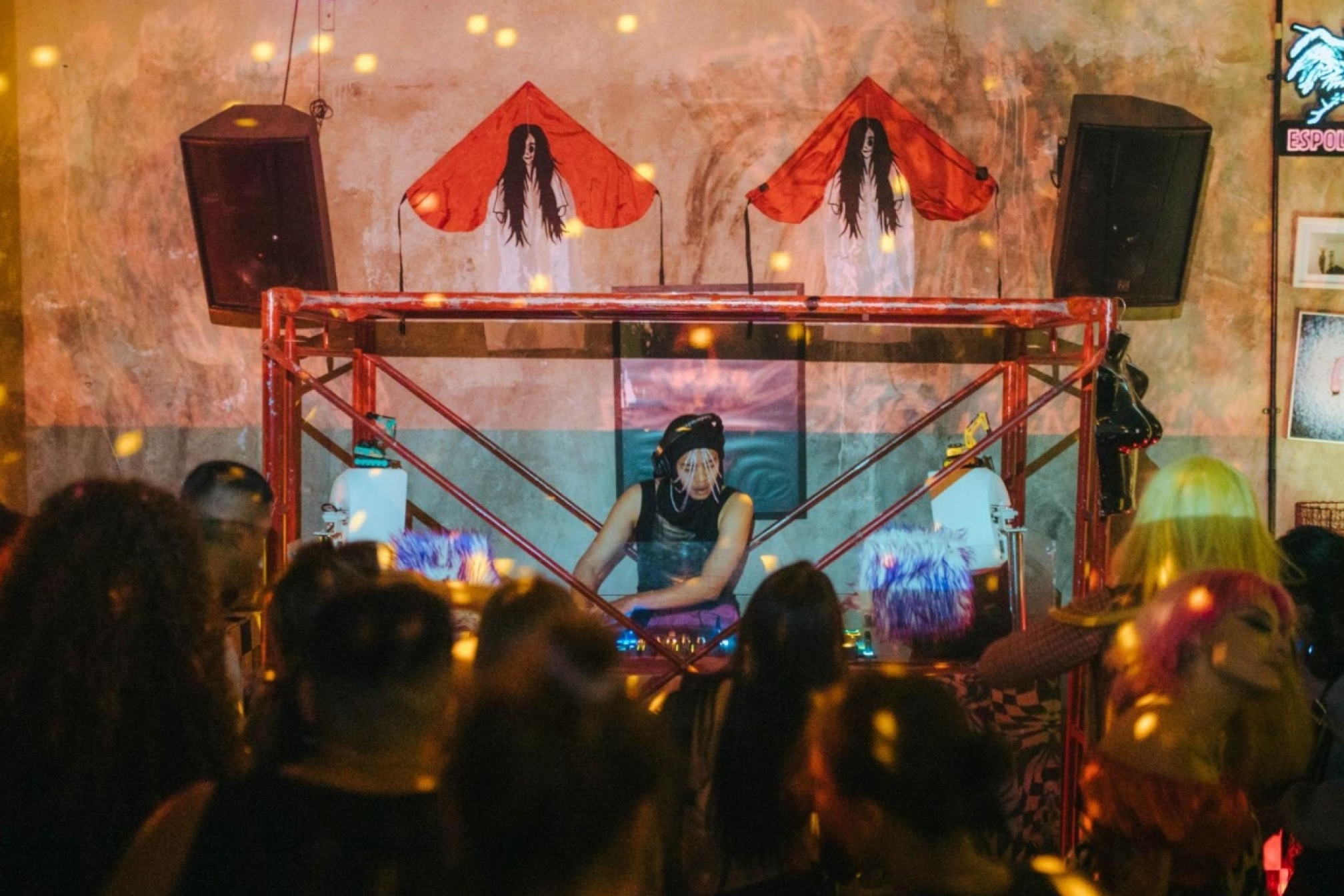 Features
Features
On queer futurity through rave collectives in Southeast Asia
Our friends at Bussy Temple explore how Southeast Asia’s queer rave communities are redefining the soundscape with local flavours and vibrant self-expression
Emerging in the late 1980s as a rebellious response to the commercialisation and uniformity of mainstream nightlife, rave culture quickly found resonance with youth in urban centres across Southeast Asia. Initially influenced by genres like acid house, techno, trance, and drum and bass from Europe and the US, these energetic beats provided new avenues for cultural expression and community bonding in the region.
Southeast Asian rave culture has had a steady development over the years, particularly finding a reverberance with the queer community. Despite the steadfast growth, the culture still faces underrepresentation in mainstream media as well as tough organising conditions. Some challenges include the lack of safe spaces, stringent regulation on public gatherings and alcohol, conservative attitudes, and systemic homophobia.
Queer Raving in Southeast Asia
Raves often function in the precarious margins of systems – but for queer raves, this is even more pronounced. In countries like Singapore and Malaysia, queer events face legal challenges like the need for government approvals of events under the possible threat of incarceration, as seen in the recent imprisonment of artists at a Malaysian drag event.
In Vietnam, anything that is interpreted as a possible offence to the state can lead to the cancellation of events. This necessitates remaining underground to allow for the carving out of a safe space, an avenue of expression against hostile systems.
When discussing queer rave culture in Southeast Asia, our friends in Indonesian collectives revealed that they have to keep a low profile for safety from religious groups or government sanctions. A trans DJ based in Bali who prefers to remain anonymous describes Indonesia in the 2000s as very limited in its nightlife culture; in the mid-2010s, the city of Bandung had a state-mandated curfew, where residents were required to be at home at midnight, due to rampant motorbike gang violence.
Bussy Temple emerged out of frustration over the lack of gender-diverse queer spaces in hyper-commercial Singapore. Armed with portable lights, four-hour-charge speakers, Pioneer DDJs, and electric candles, we claimed an abandoned tunnel as our womb. We began hosting invite-only, small-scale gatherings, where queer kin would invite other queer kin and join for a night of thrashing.
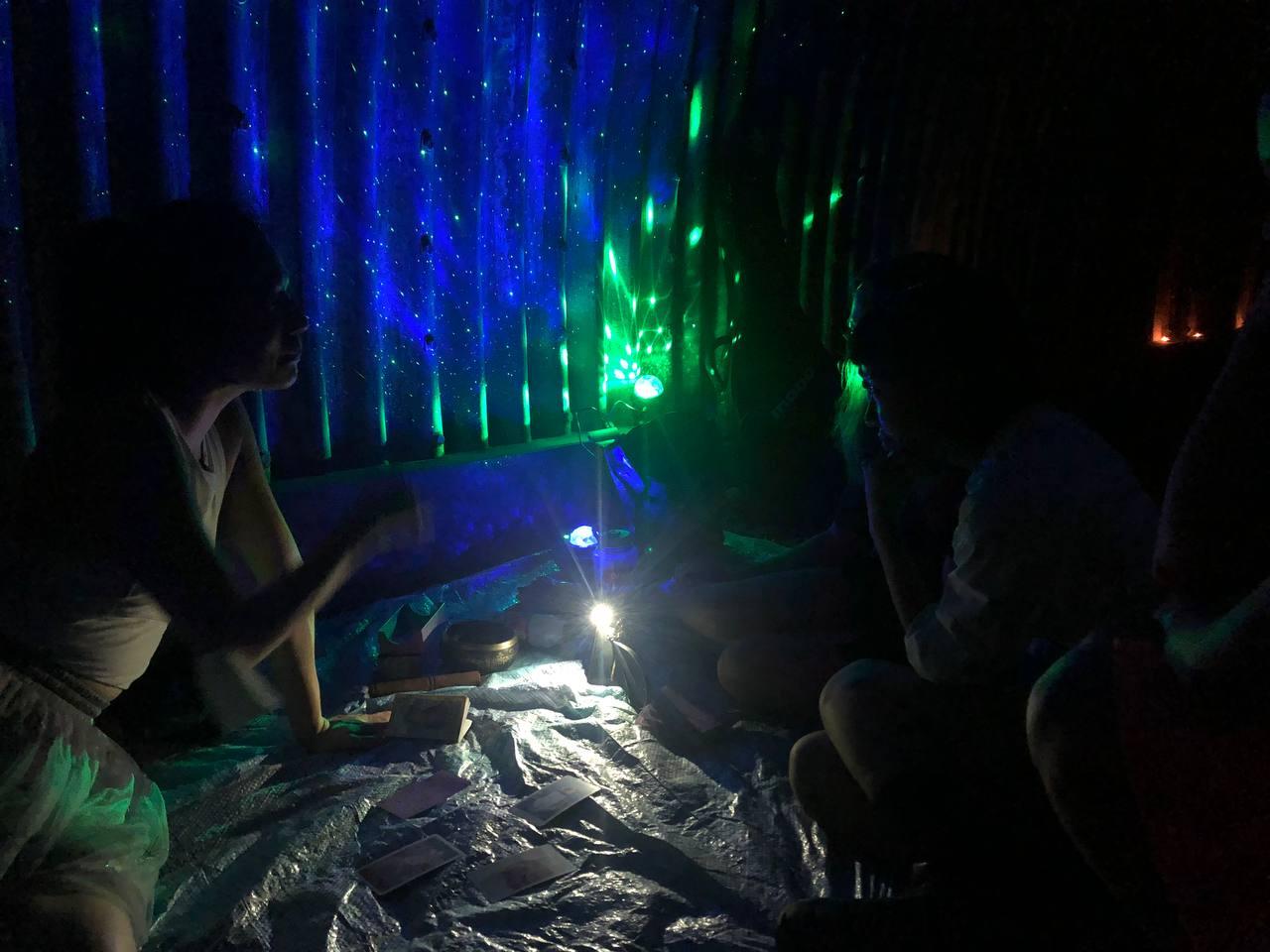
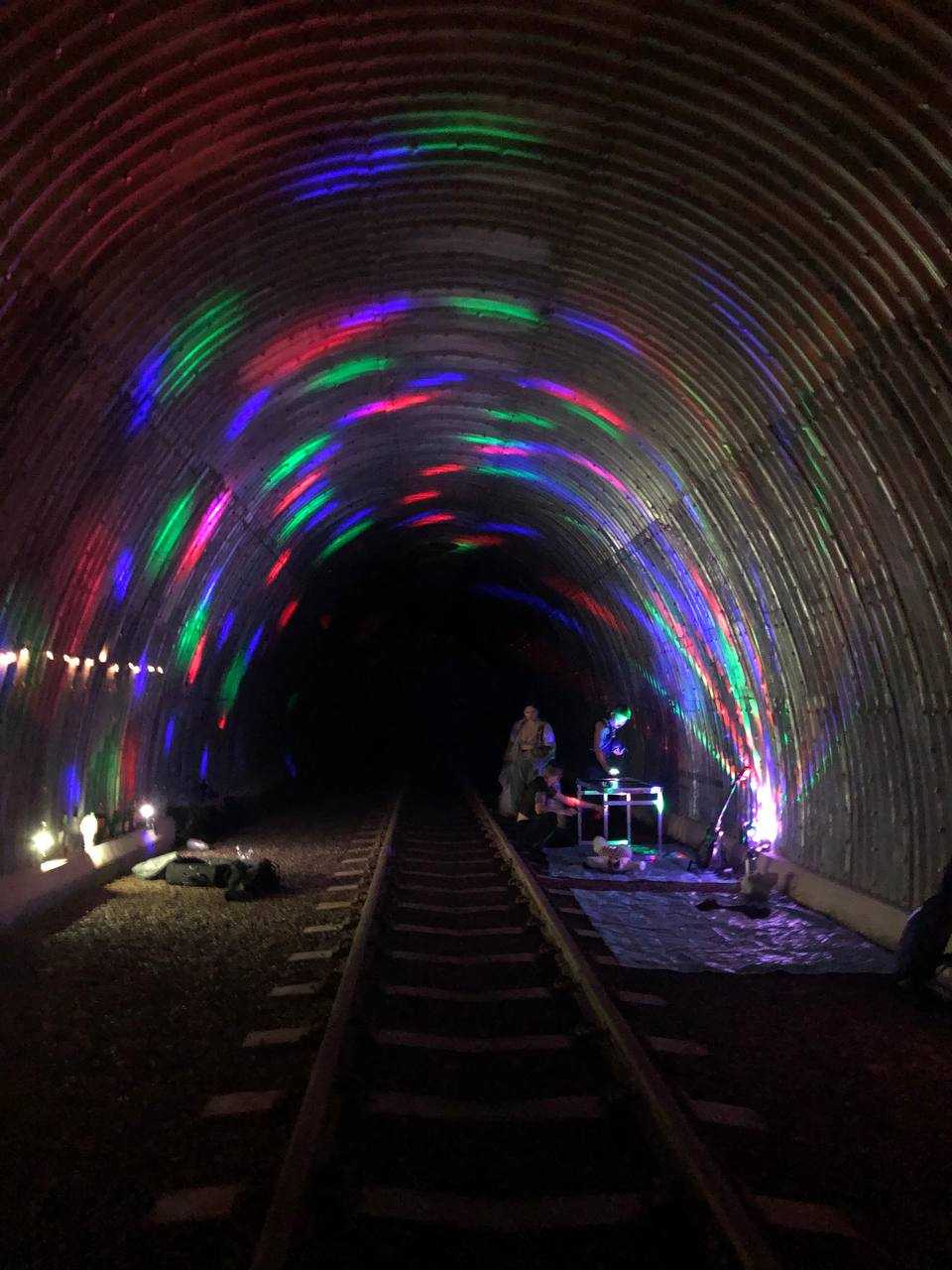
As trans, gender-diverse, and femme bodies navigating everyday life in Singapore, we found solidarity in the angst and frustration held in our bodies; the ways we learned to tense, the ways we learned to minimise ourselves. Hard, fast, and unapologetic genres were what manifested, described by our friends as a distinctive soundscape defined by ‘trans-angst’ and "cathartic release". We needed an outlet, which we found through those tunes that felt authentic to us. We soon found a growing community that resonated with our form of solidarity and release.
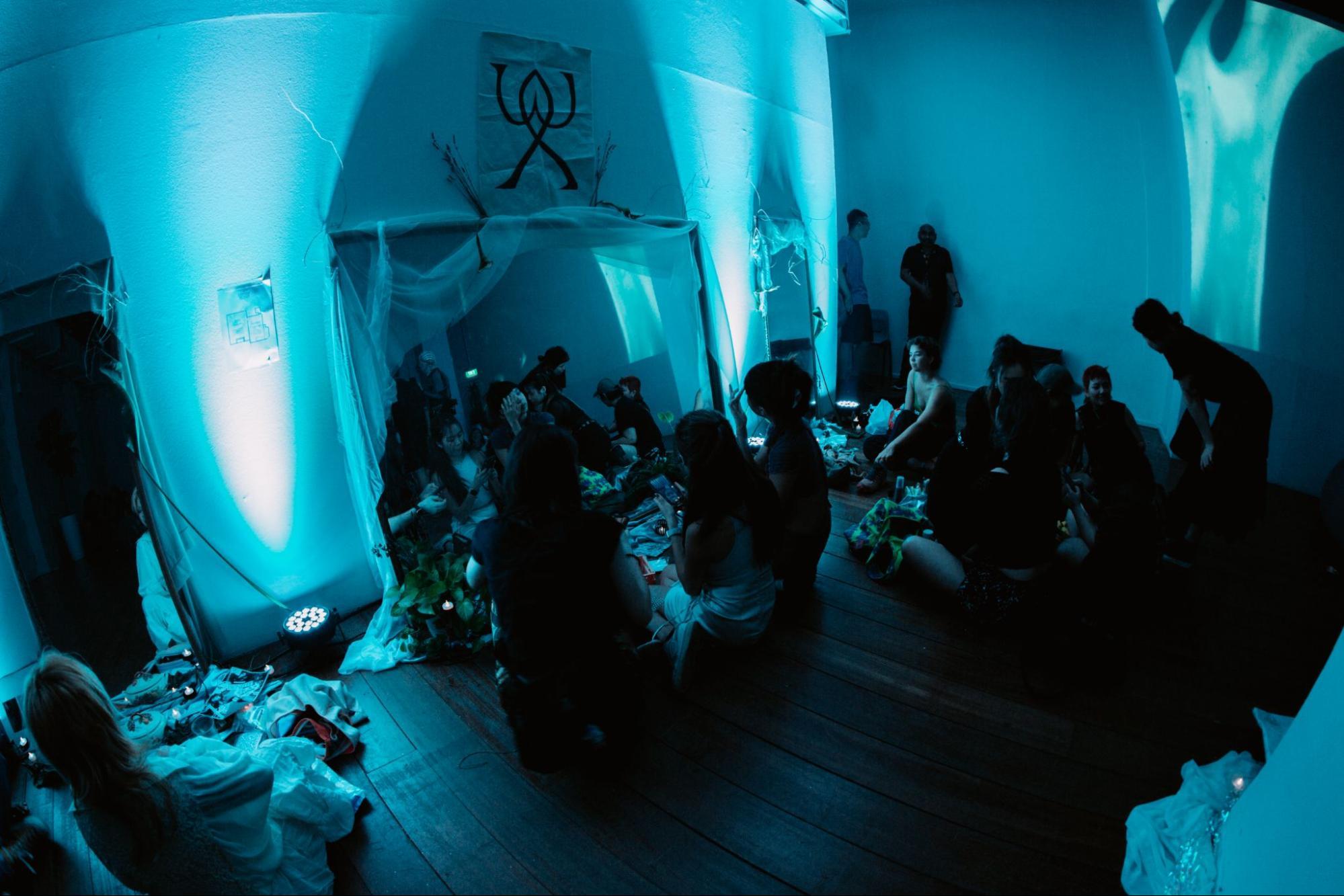
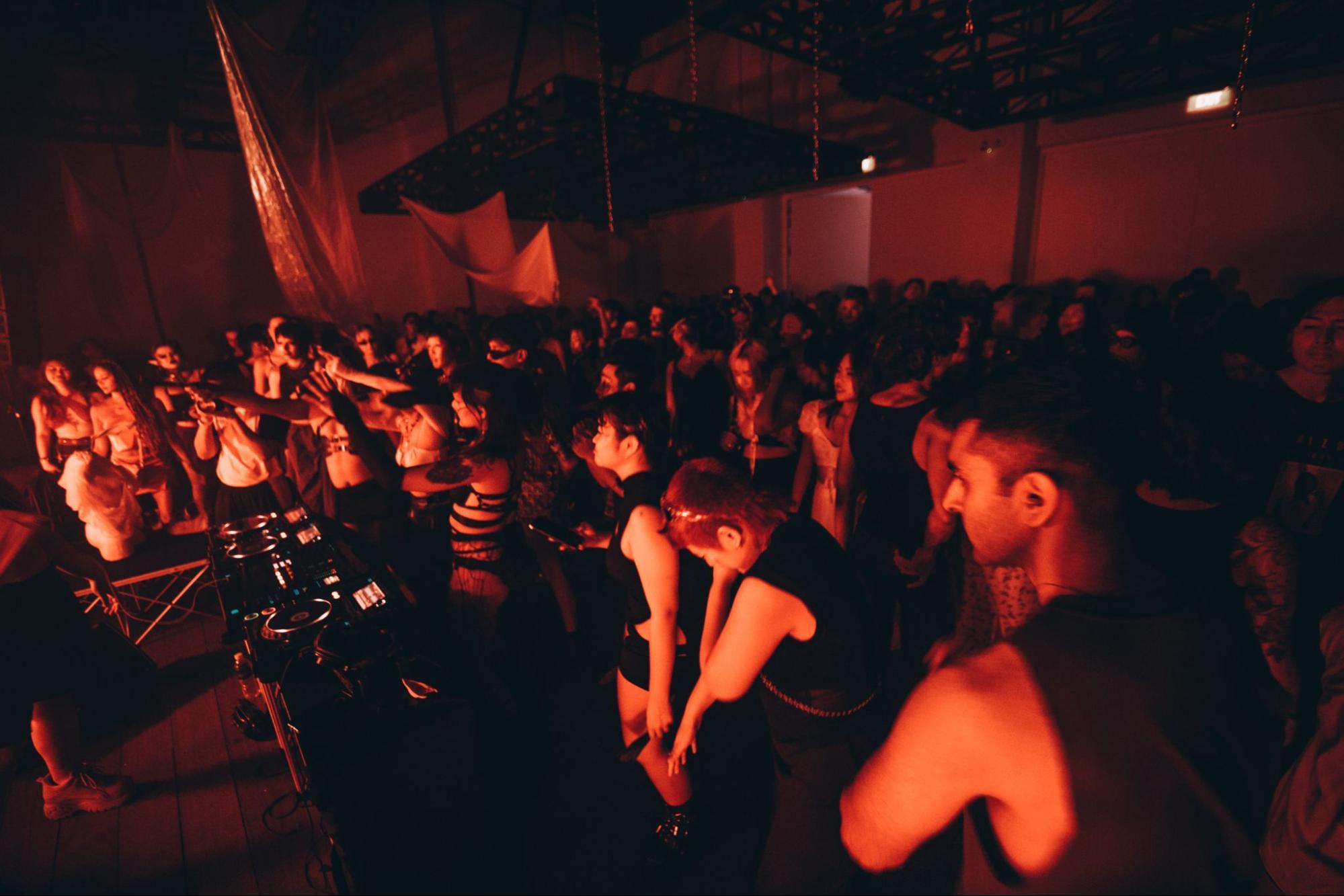
Evolution and Authenticity in Post-Pandemic Southeast Asia
“It was only after the pandemic in post-2020 that people were braver to hold raves that were safe for gender-oppressed people—sporadically, of course.” - Anonymous trans DJ (Indonesia)
The wider Southeast Asia club scene has seen an influx of commercial clubs, often centred around Berlin-style techno: music characterised by loops, repetition, and the layering of grooves and heavy bass, along with dim lights and red lasers in a dark room.
Southeast Asian queer communities are exploring and nurturing a slightly different direction – irreverent, quirky, with ferocious BPMs. Often spotted are high-energy tracks with percussion elements that reflect Southeast Asian genres, salacious remixes of LGBTQ anthems, and quick manic transitions that parallel the internet-influenced zeitgeist.
“The new generation of club kids who emerged from the purgatory of COVID-19 isolation, natives of the subterrestrial internet and TikTok hypomanic consciousness, unspoiled by never having stepped into a local nightclub or commercial club space. They went from the bedroom into the rave spaces and developed a real appetite for it. The way they consume music is ferocious too, and quite eclectic.” - XUE, Endless Return (Singapore)
Read this next: How black women and queer communities are shaping the future of African electronic music
Moving beyond the reproduction of genres that have landed in Asia from the West, queer collectives and DJs in Southeast Asia are unearthing and remixing indigenous instrumentation into the contemporary soundscape, and creating safer, more inclusive spaces for gender-diverse individuals.
The dynamic and multifaceted underground scene in Southeast Asia reclaims and celebrates local musical identities.
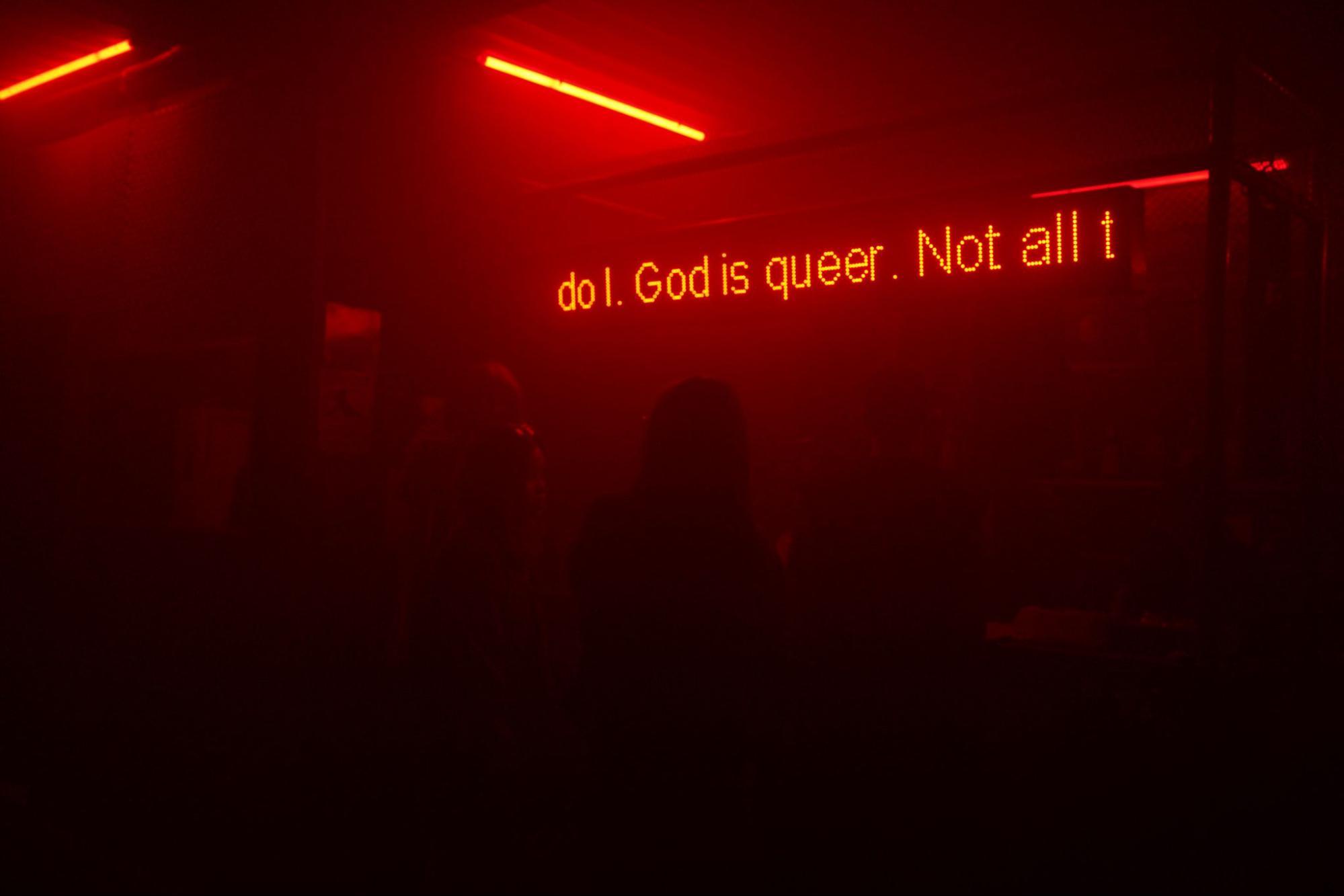
The Emergence of Local Identities and Music Cultures
In this new era of exploring and defining the Southeast Asia rave sound, underground collectives are keen to platform music produced by the community. In Yogyakarta, Indonesia, there’s a wave of punk-electronica arising from the mixing of punk heavy metal with experimental electronic music, along with elements of traditional instruments. In the Philippines, budots – characterised by fast-paced rhythm, quirky sound effects, and DIY production ethos – has become a mainstay in the scene, now beginning to gain international recognition.
In the championing of local sounds, the Southeast Asian scene welcomes newcomers, prioritising play over perfection. In Saigon, many of the collectives started learning how to DJ through YouTube tutorials. The ethos of exploration over gatekeeping feels palpable: “Here, we have queer, straight, gay, and lesbian members, so all kinds of music are welcomed and respected. As long as you can bring a joyful and free atmosphere that makes people dance until you drop your pussy on the dancefloor, you are welcome” - Smoothie Boiz of Bung L0n (Vietnam)
Read this next: Women’s month spotlight: Electronic Filipino women & queer DJs who are fighting the fundamental lack
Under the circumstances of an ongoing civil war post-coup in Yangon, the crew behind Red Room are paving the way for a bridge between club music and local underground culture. Seeking diversity from the mainstream EDM clubs that were the popular option, they chose instead to platform well-loved regional acts like Vietnam's Chi Min, Malaysia's rEmPiT g0dDe$$ and one of our own from Bussy Temple, howrøng. Red Room has evolved into an underground space for all, and in the spirit of a rave, a space for experimentation of identity and music.
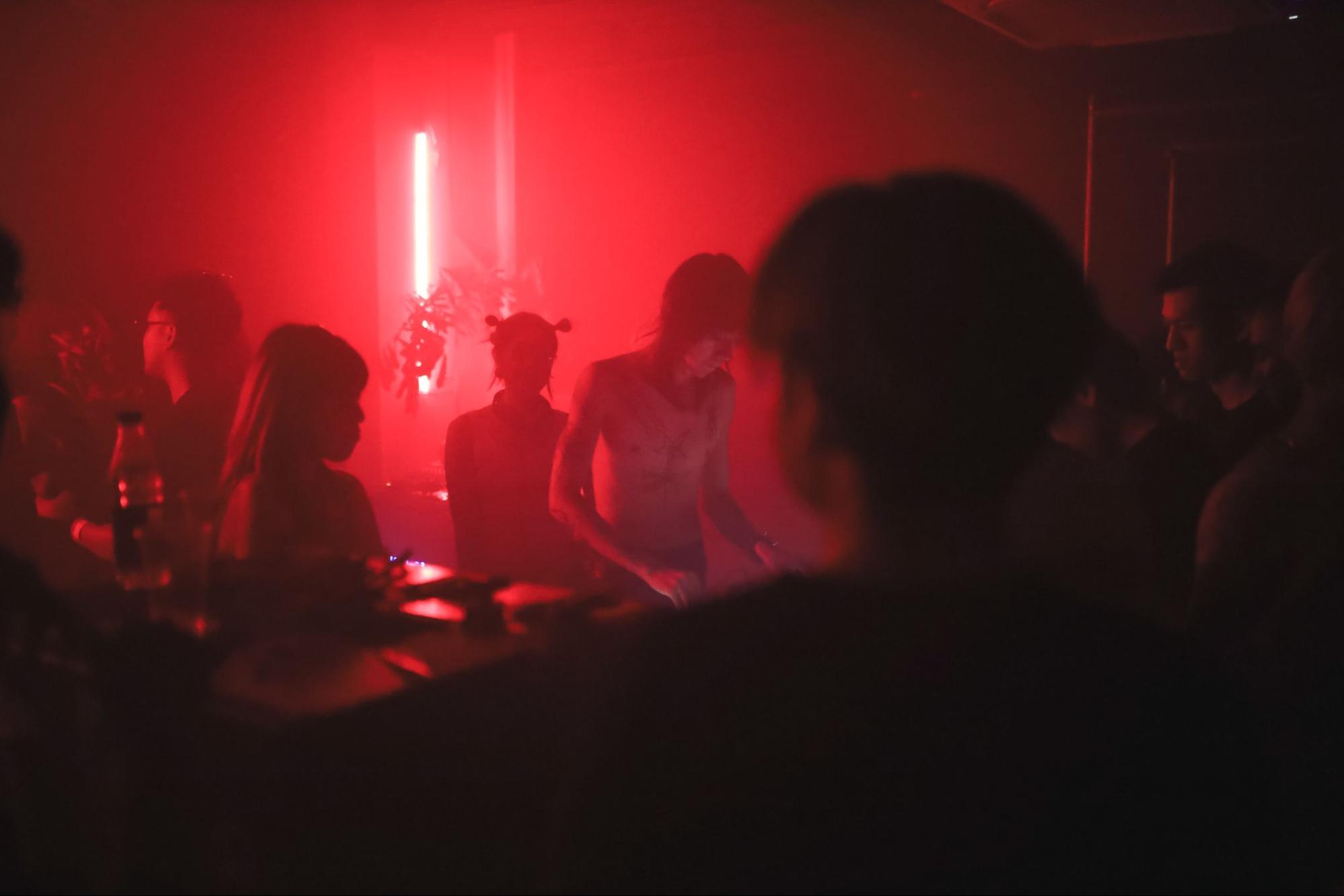
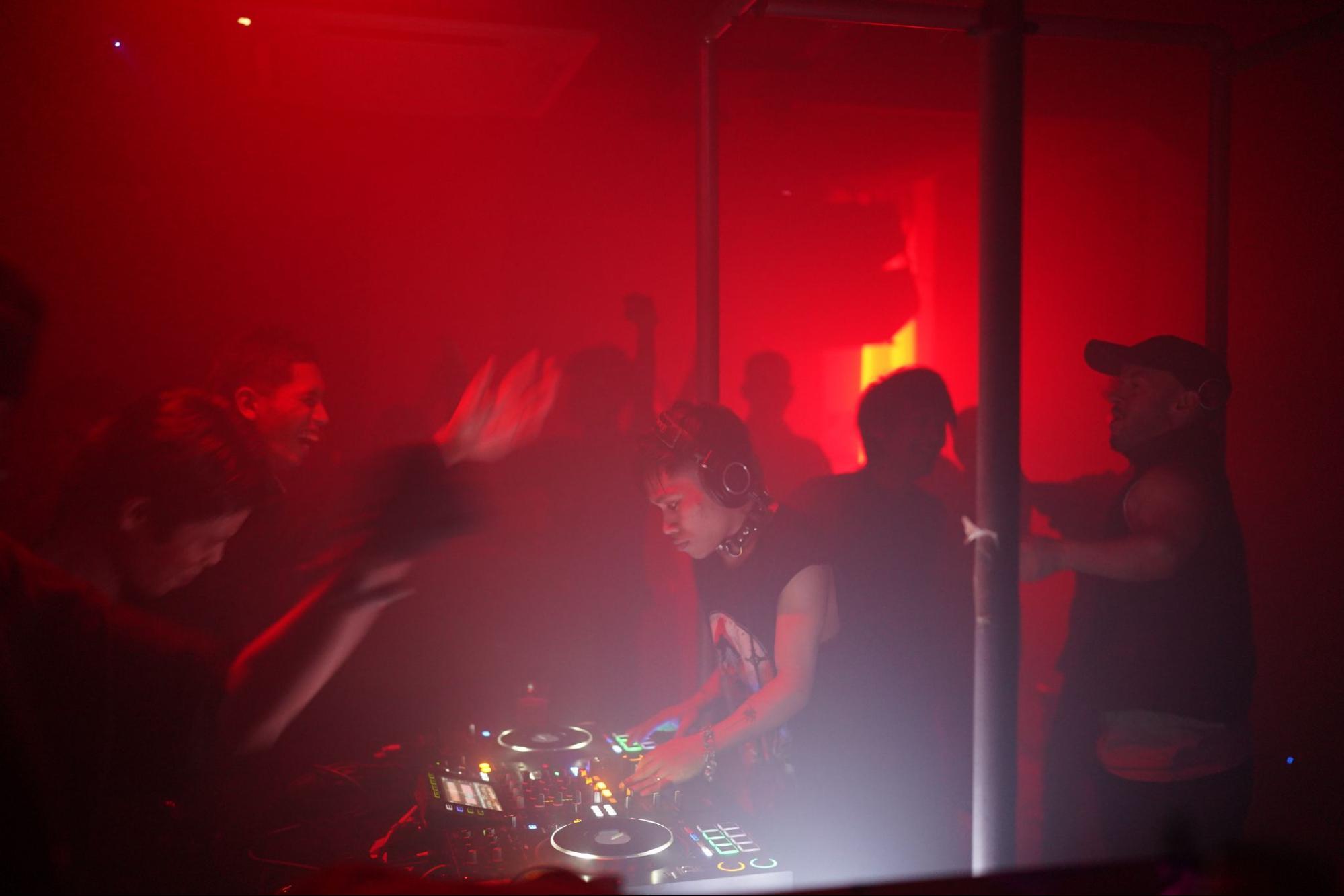
Community formation and accessibility are also prioritised: Resident DJ Lalit frequently holds DJ workshops for local young budding DJs, enabling them to take part in shaping the scene themselves.
Red Room also released their first compilation on Bandcamp, 'SADDAR NO'—one of the first in the region to be produced and released to represent their underground sound featuring local producers.
“Most of us first entered nightlife through techno, though some younger ones through Yangon’s recent wave of mainstream DnB. But in trying to keep things current and fun, we have taken 'techno' and all its radical, subversive cousins and let them mutate into myriad things. Our signature sound is harder, bolder, and grittier than the straight-ahead European techno that predominated the scene before us, with a bit more booty, syncopation, and a lot of fun and wacky surprise headtrips.” – LALIT, Resident DJ of Red Room (Myanmar)
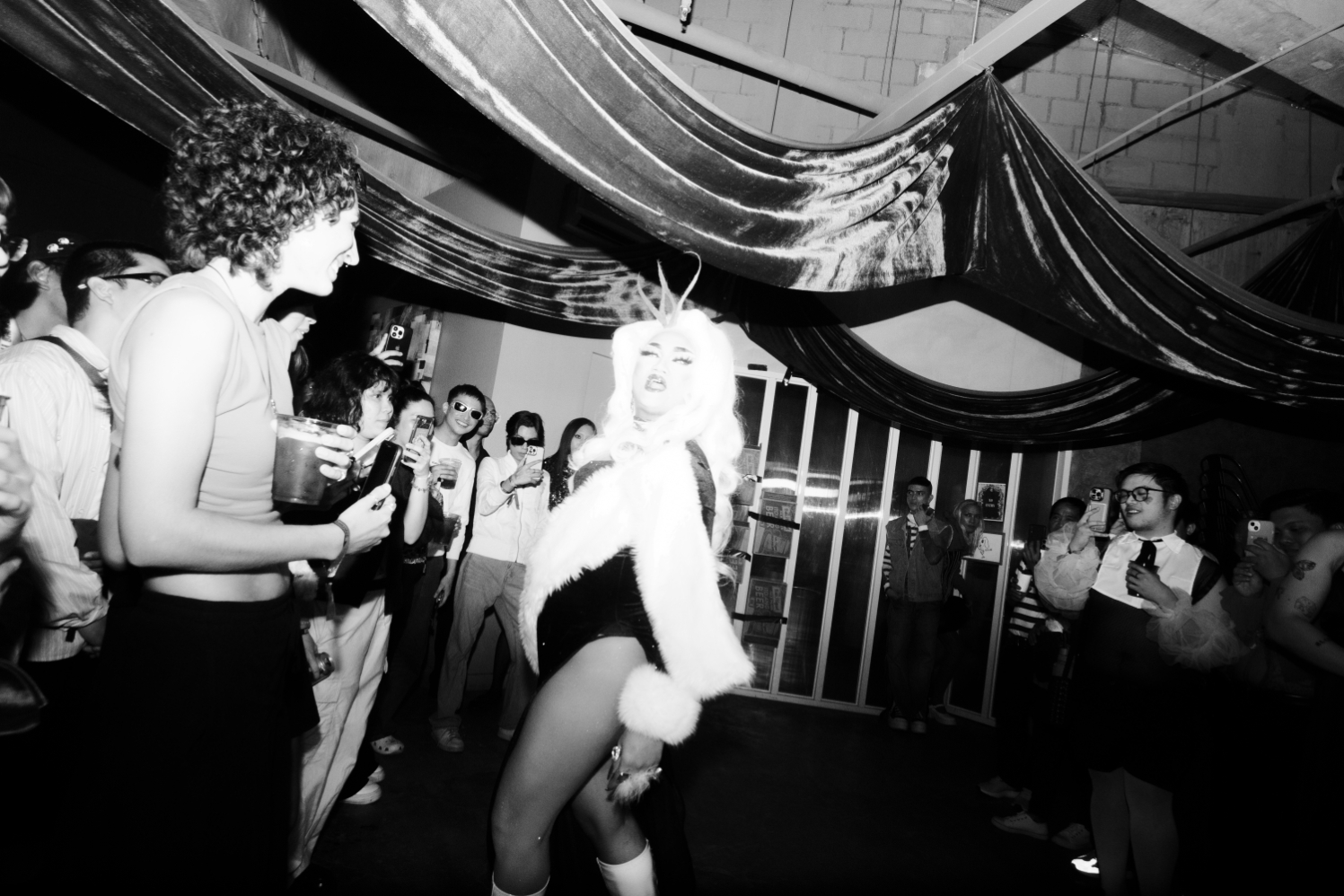
The Future of Queer Raves in Southeast Asia
The queer rave scene across Southeast Asia is thriving and pulsating, and finding ways to breathe with one another across waters. We see local genres travelling across regions, and an influx of regional collaborations: the Arcan (Vietnam) sixth anniversary brought together three rising queer collectives, Bussy Temple, NON NON NON (Thailand) and Moth Agency (Hong Kong).
Read this next: Thirst for freedom: Kyiv’s queer clubbing community returns to the dancefloor
There are also efforts to unite the SEA electronic music scene online with the emergence of ALIGN.ONLINE—a Southeast Asian digital platform that promotes cultural and sound innovation through spotlighting the work of Southeast Asian women/trans/non-binary/gender non-conforming contemporary electronic music practitioners, run by rEmPiT g0dDe$$.
Bussy Temple's recent collaboration with the collective ALIGN.ONLINE for Hong Kong Community Radio residency launched the series 'Lethal Fantasy', which aims to highlight Southeast Asia’s burgeoning femme and queer artists in the contemporary electronic music scene.
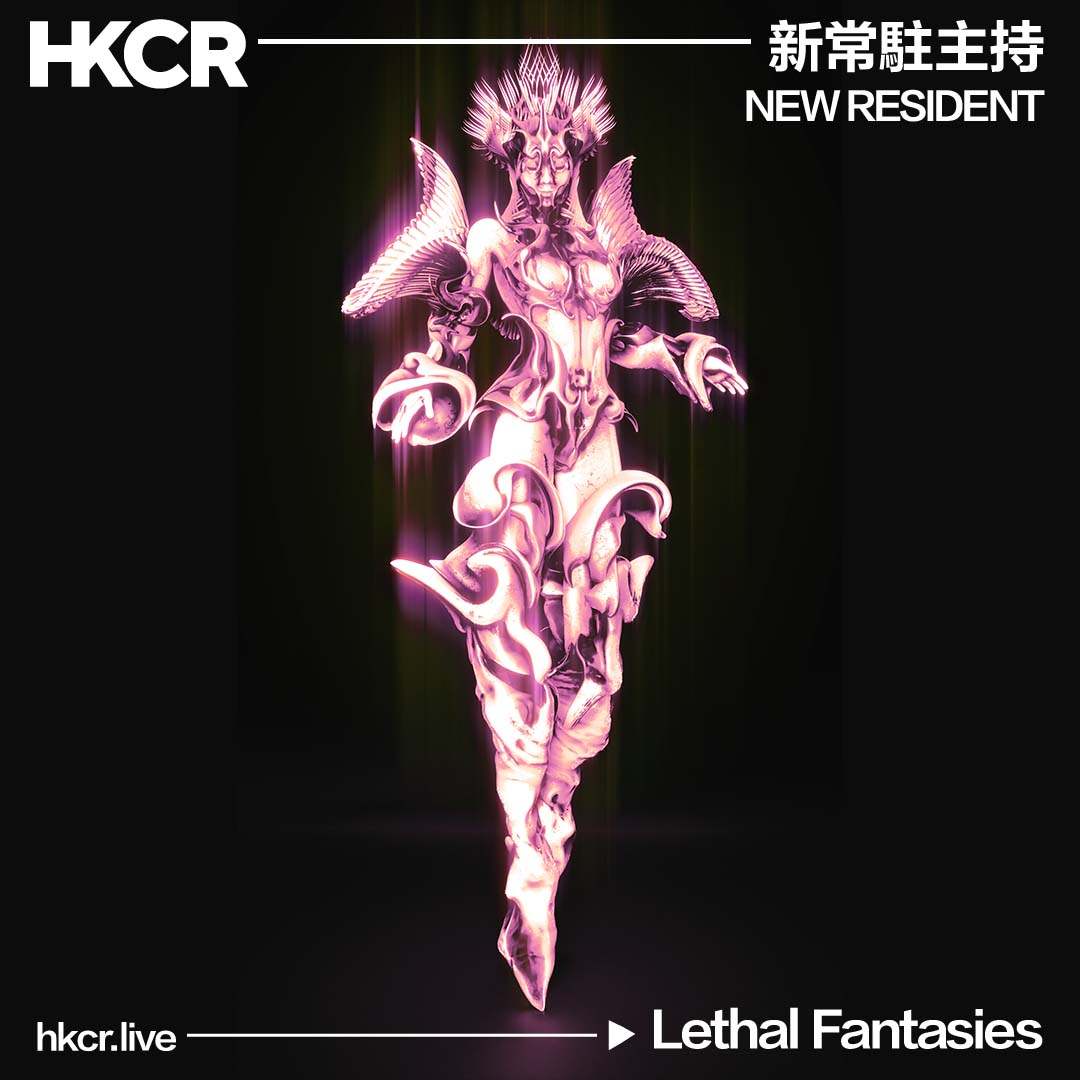
“What's particularly exciting is the emergence of a cohesive 'South East Asian' identity, a cultural resurgence that was historically fragmented by colonisation that divided us into separate nations. This identity is now being built upon shared cultural experiences and a collective struggle against the dominance of Western rave music.” - Teya Logos (Philippines)
There is a palpable urge to challenge the purist notion that mixing music outside of the more well-recognised Western genres of electronic music (techno, house) is uncouth or unpolished. The queer rave scene here in Southeast Asia plays with these expectations and basks in the undefinable.
Read this next: "Genuinely needed": How WAIFU is revolutionising Tokyo's queer nightlife
“The music that I found in the queer rave music space that was formed in Indonesia, especially in Bali, was bolder, emotional, and of course cunning because it dared to mix and match experimental-electronic music and world music with pop music, for example like vinahouse. which is closely related to donk, jedag-jedug which is closely related to breakbeat, or funkot which is closely related to dutch house/dirty dutch. They are braver in not classifying classes by music genre.” – Anonymous trans DJ (Indonesia)
Queer raves begin from a desire to reimagine what is possible, to challenge dominant scripts, to dream of a different world. To allow ourselves to express and be seen, uncensored, held by queer kin. The movements to coalesce and redefine rave music in irreverent and distinctly Southeast Asian ways hints at collective reimagining on a regional scale—of new worlds to come.
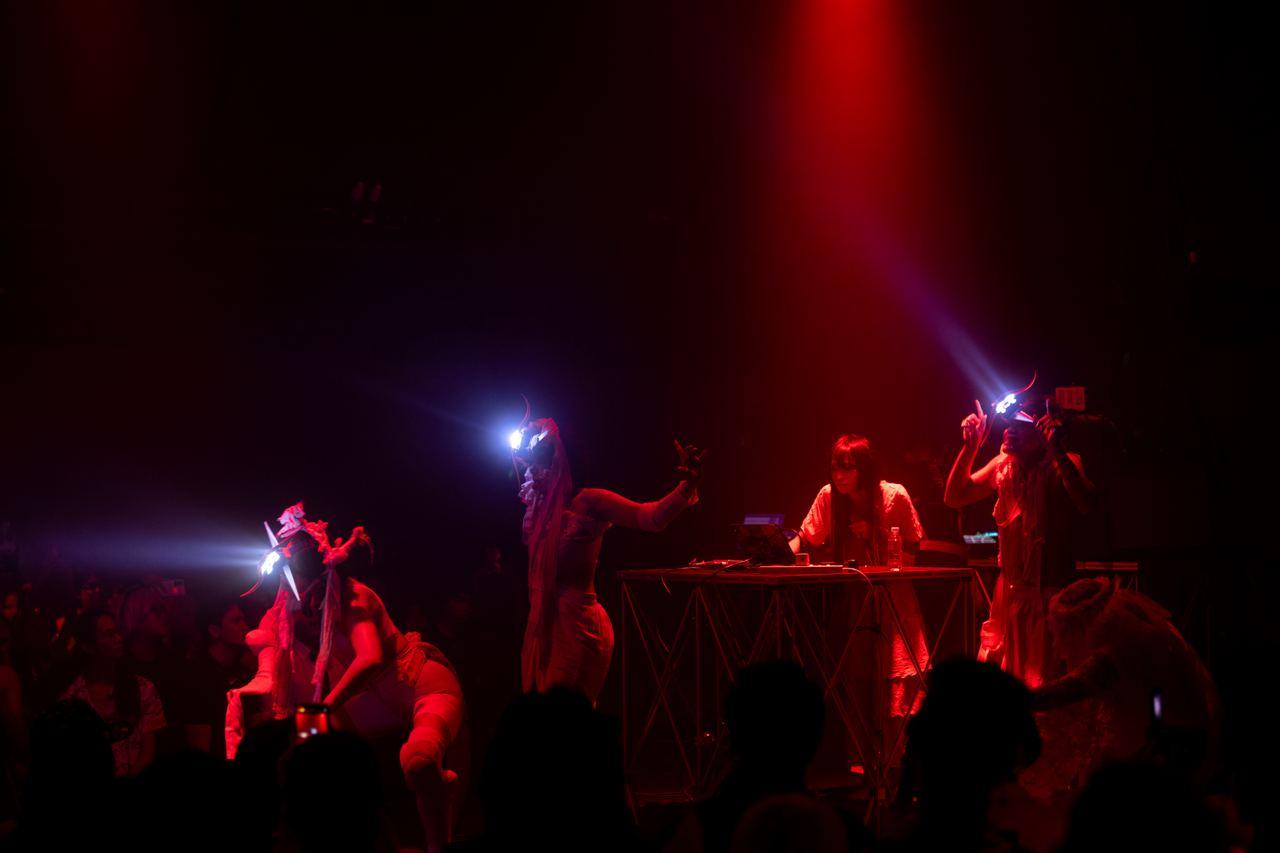
In the spirit of sharing and spreading the love, Bussy Temple would also like to shine the light on our friends, community, and network of collectives, who are reimagining the identity of queer rave culture and music in Southeast Asia with us.
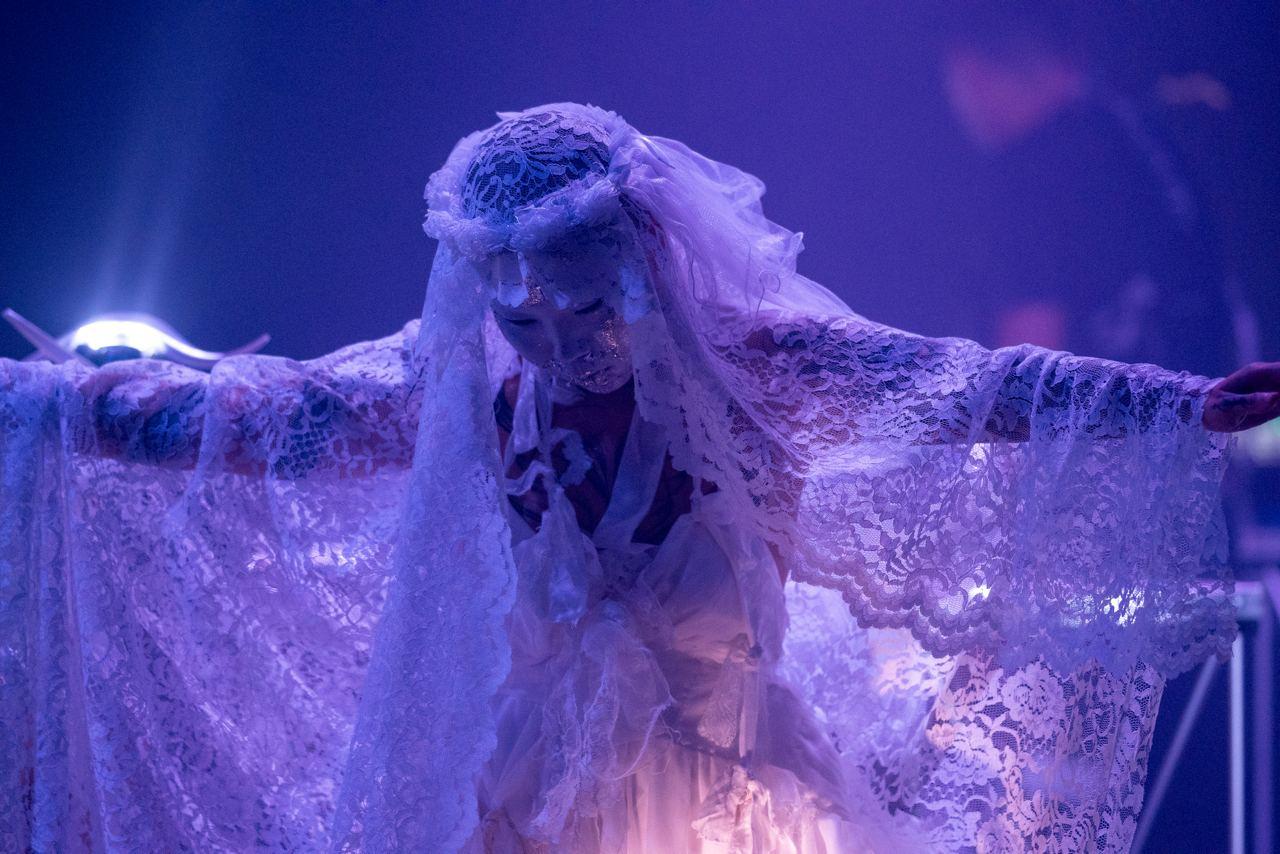
Endless Return (Singapore)
Endless Return is a rave collective and music label run by butoh dancer XUE and artist/producer Mervin Wong based in Singapore. It first birthed itself in 2020 as a virtual rave during the lockdown and threw its first warehouse rave featuring artists such as rEmPiT g0dDe$$. Since then, they have featured various artists from the region such as obese.dogma777 and Teya Logos. Their soundscape revolves around "deconstructed club"—an anti-genre with a postmodern approach that involves destroying, cutting up, collaging, and reconstructing sounds and samples, often with a strong sense of irony. As a music label, they release music from various local artists, and later this year they will be releasing electronic producer Mahamboro's new collaborative project, Proto Animalia.
Intervention (Singapore)
Intervention is an irreverent queer party based in Singapore, started in 2022 by a collective of queer individuals who sought to bring a local flavour to the queer party music scene in Singapore. Celebrating diverse sounds from all over the world, their music ranges from femme incantations to queer mantras, from kuthu to kuduro, from dabke to dancehall. Here, there is room enough for everybody, for everyone to be whoever they want to be.
FOMOHOMO (Singapore)
FOMOHOMO is a queer party collective on a mission to elevate Singapore's queer party scene by joining forces with diverse collectives to showcase international and local DJ acts, with a focus on platforming queer talent. Known for signature events like MISS HOMO techno party series, HARDTHROB queer kink rave, and Sunny Side Up day time parties, FOMOHOMO has hosted acts from international headliners HAAi, Bianca Oblivion, Cormac, Dana Montana to local DJs in the region JonnyVicious, loyboy, howrøng and Godkorine. They also collaborate with queer collectives like Elephant Party and POOF DOOF Australia.
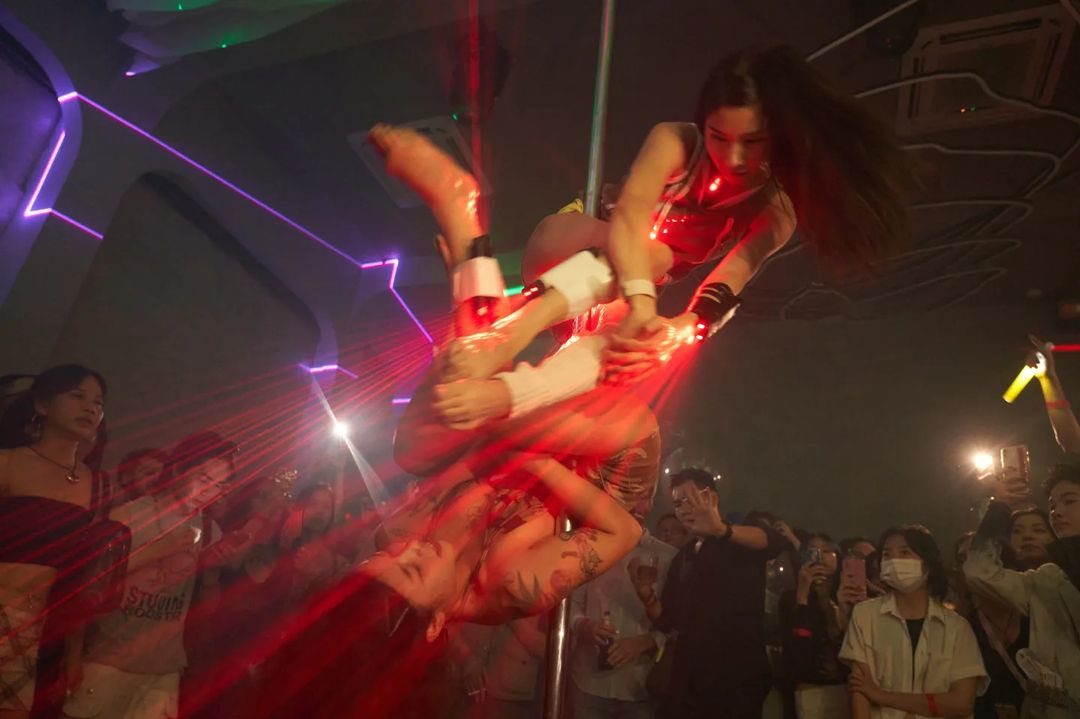
GÁI NHẢY (Vietnam)
Gai Nhay is a lesbian collective established in 2022 to represent the vibrant fun femme energy that was lacking in the party scene in Saigon. Since their first massively successful sold-out event, their community has grown exponentially. The music they play ranges from vinahouse to K-Pop edits and happy hardcore, a mish-mash that put together results in a unique Saigon lesbian sound. Gai Nhay’s energy is best captured by a statement from one of the founders, Lu: “One thing we never miss is the hottest, loudest, sexiest crowd!”.
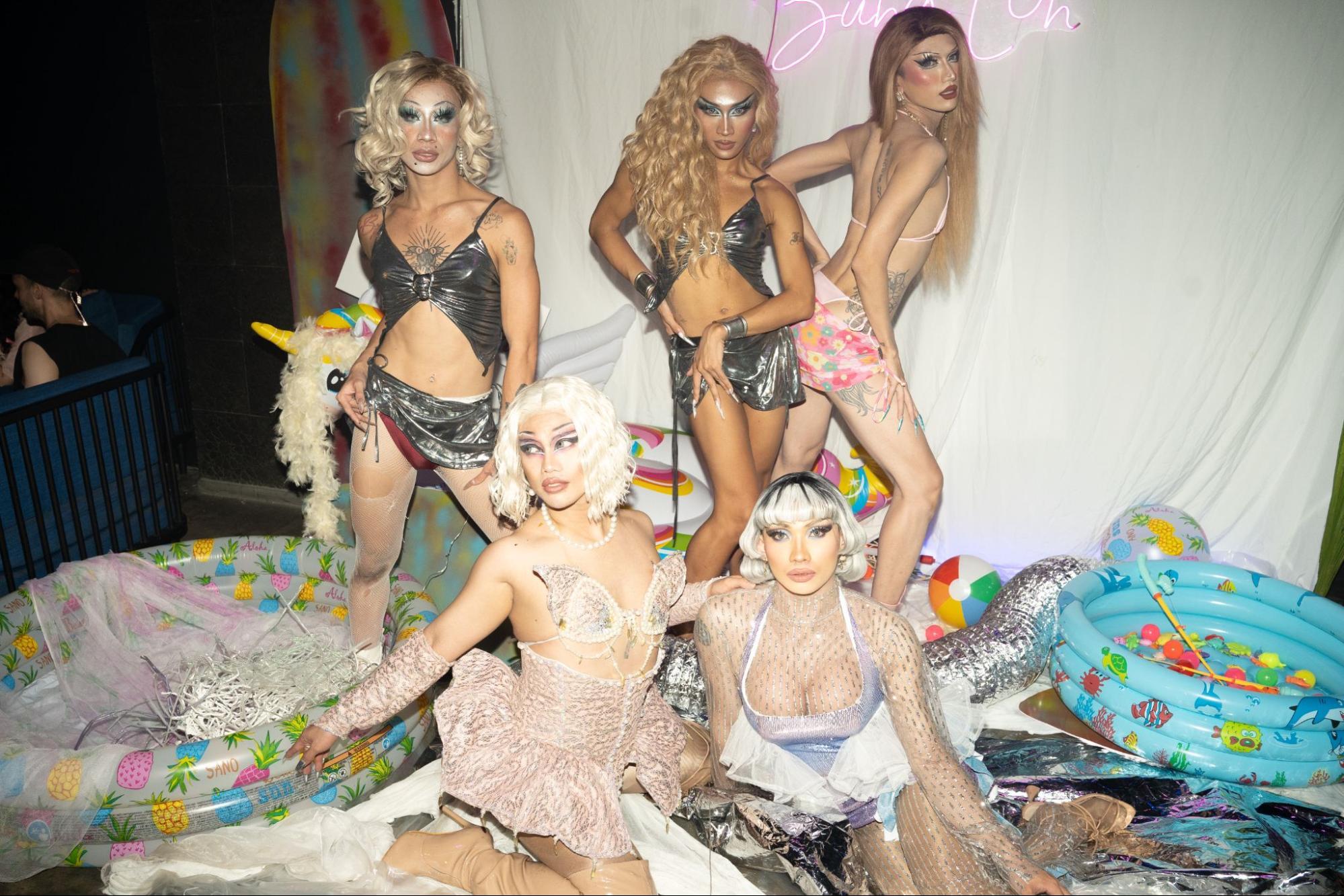
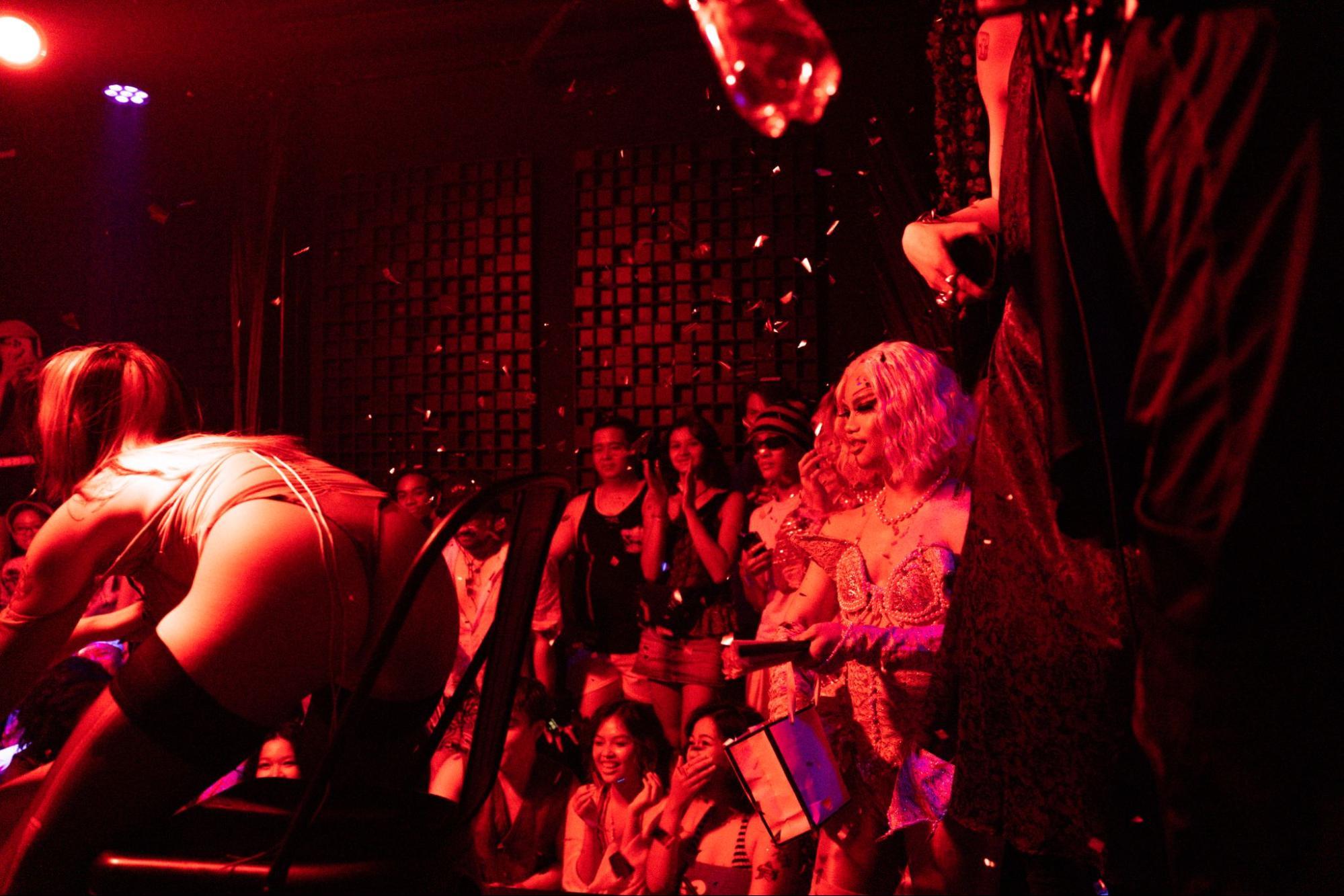
Bung Lon (Vietnam)
Established in August 2022, Bung Lon comprises three members: Smoothie Boiz, Phát Paris, and dOnut, all young budding DJs and familiar faces in the queer party scene. The name of the event Bung Lon is a fun phrase they used when partying – you can interpret it as "dance until you drop your pussy on the dancefloor or you pass out."
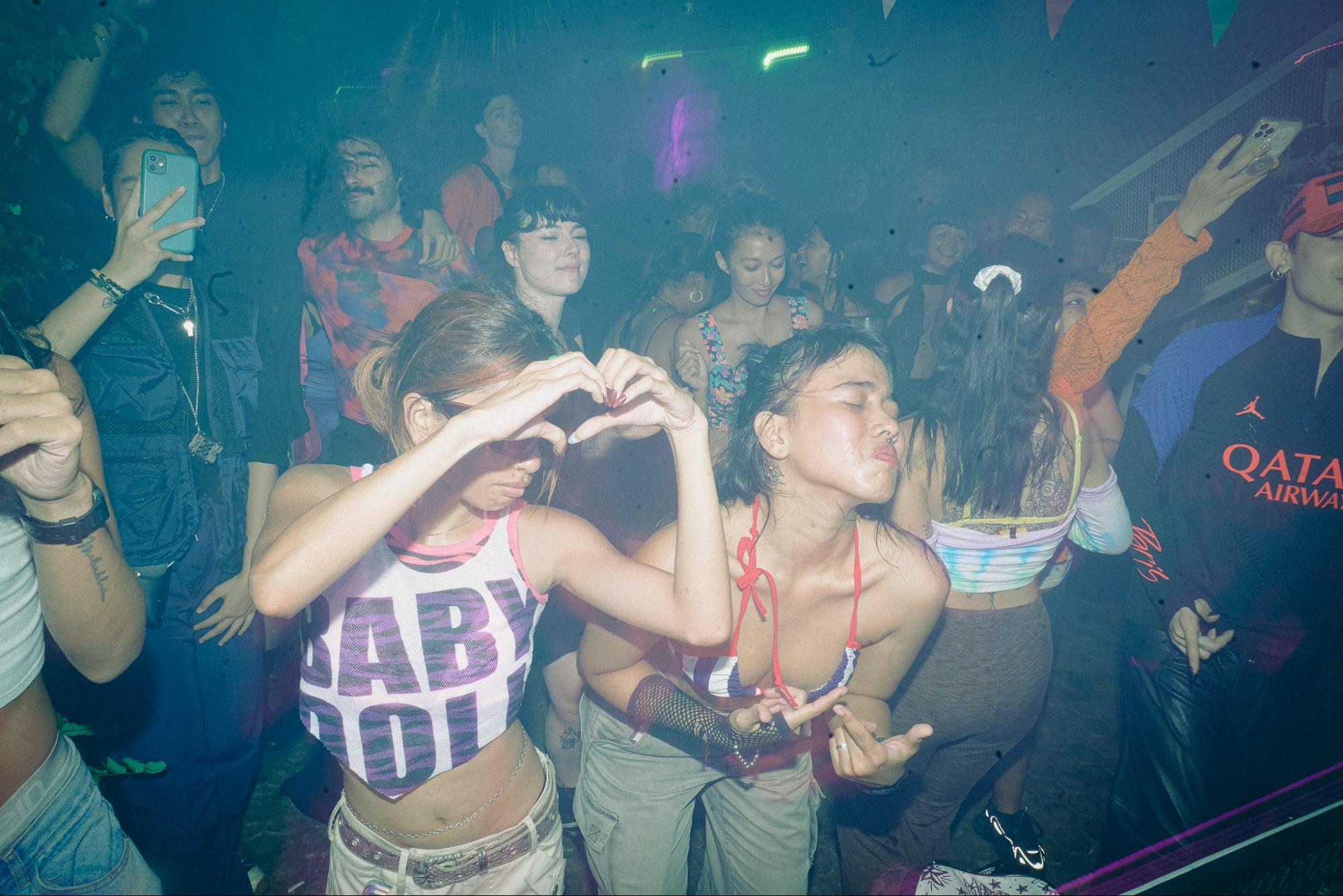
Bali, Indonesia
In Bali, there exists a thriving scene of queer collectives that explore a wider range of music—everything from jersey club and hyperpop to local genres such as funkot and dangdut. These collectives have requested to remain anonymous for the safety of their community. They shared with us that their movement began as a response to the dominance of foreign and cis-hetero DJs at parties across Bali, as well as homophobia still prevalent at many venues.
As tourists flock to Bali, they are typically treated to the familiar beats of house and beach club music. However, at various events, they aim to break the mould by featuring local DJs to highlight and promote local EDM genres such as funkot, dangdut and koplo.
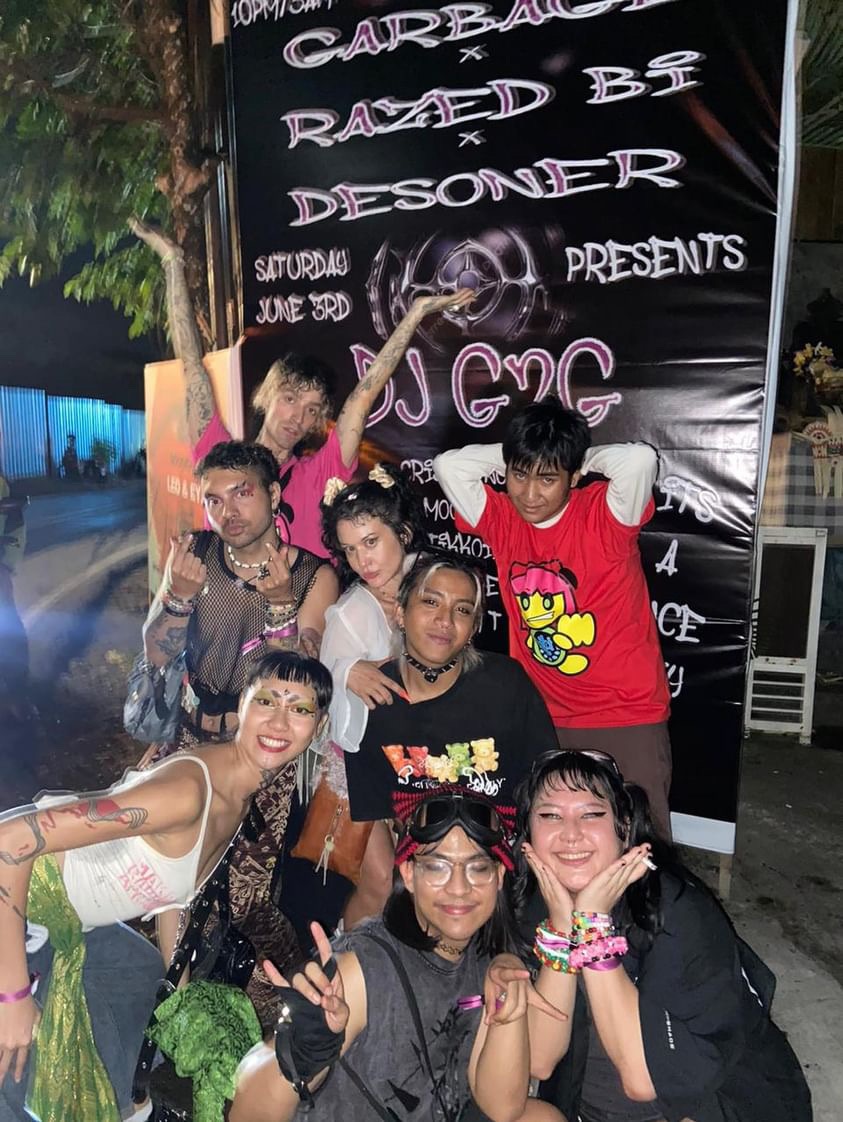
“I started my QTPOC events out of anger and frustration. We grew up in a clubbing scene that would allow foreign cis-hetero bodies free entry to a club while charging locals 1/4 of their monthly wage for door entry. Our first event in 2020 set the tone for remoulding the landscape and brought QTPOC awareness to the forefront. If you were QTPOC, entry was free. If you were not part of the community, you had to pay entry. We did not set this tone to isolate, but to make foreign cis-hetero people understand that in this space, although you are welcome, you need to understand you are a visitor. This space is for QTPOC bodies to feel safe, and as a foreign cis-hetero person, I need you to feel what it feels like to have to take a seat in the back for once”. -Anonymous DJ and organiser (Bali)
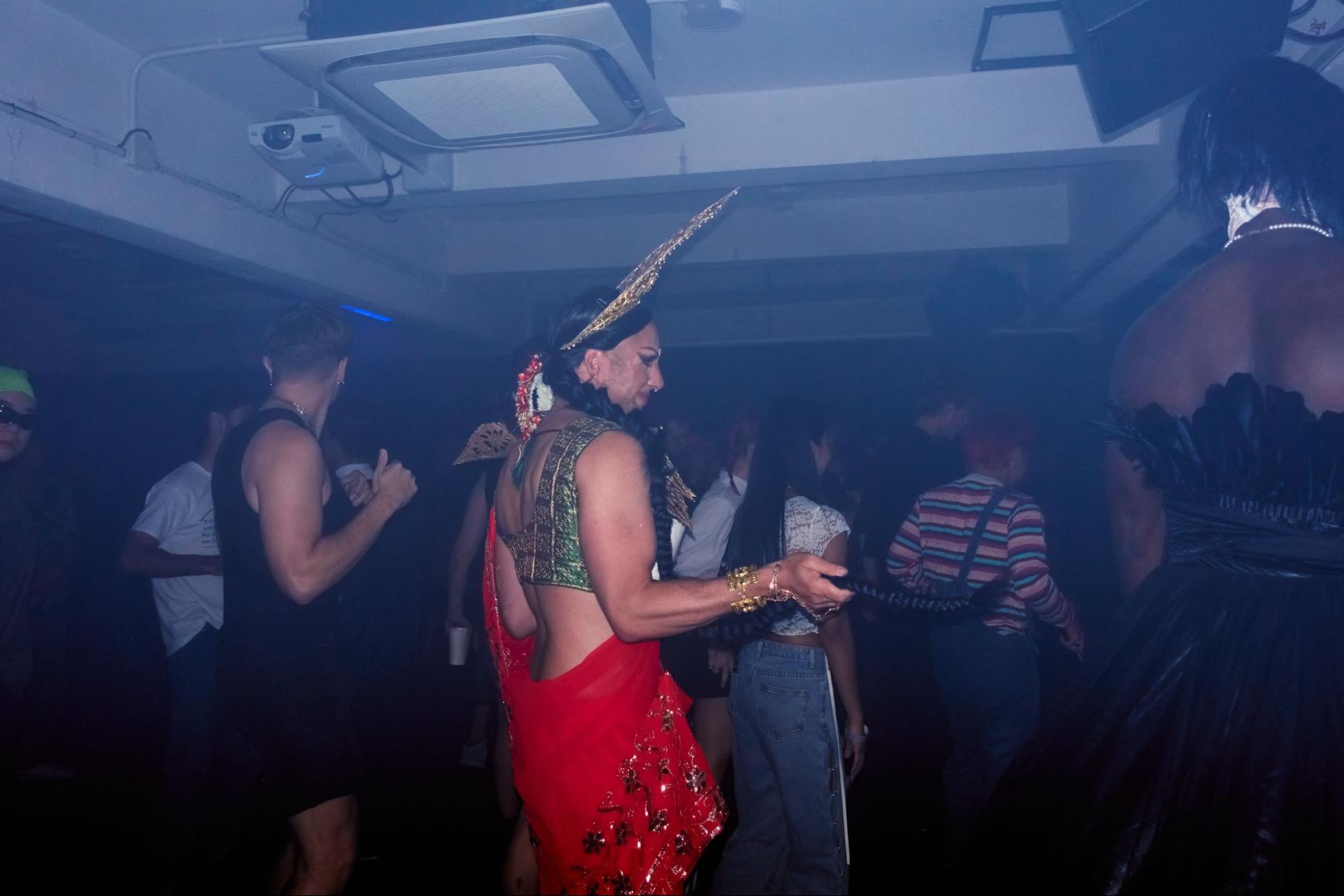
NON NON NON (Thailand)
NON NON NON was founded in 2018 by Mae Happyair together with Wanton Witch to create a platform that catered to the music they enjoyed – harder, faster techno sound that was not so prevalent at the time. At every event, they strive to proliferate sub-genres of dance music, whether it be hard dance infused with vocals from local songs, deconstructed club, fast hard techno, or classic hardstyle. Their music carries meaning and serves as a reflection of their community and politics, all done in NON NON NON's way.
They felt at the time that queer communities were lacking, and their vision was to create an inclusive space where individuals of all genders could come together, transcending societal boundaries. They aimed to showcase our equality within the music scene while providing a safe haven for those exploring their gender identity.
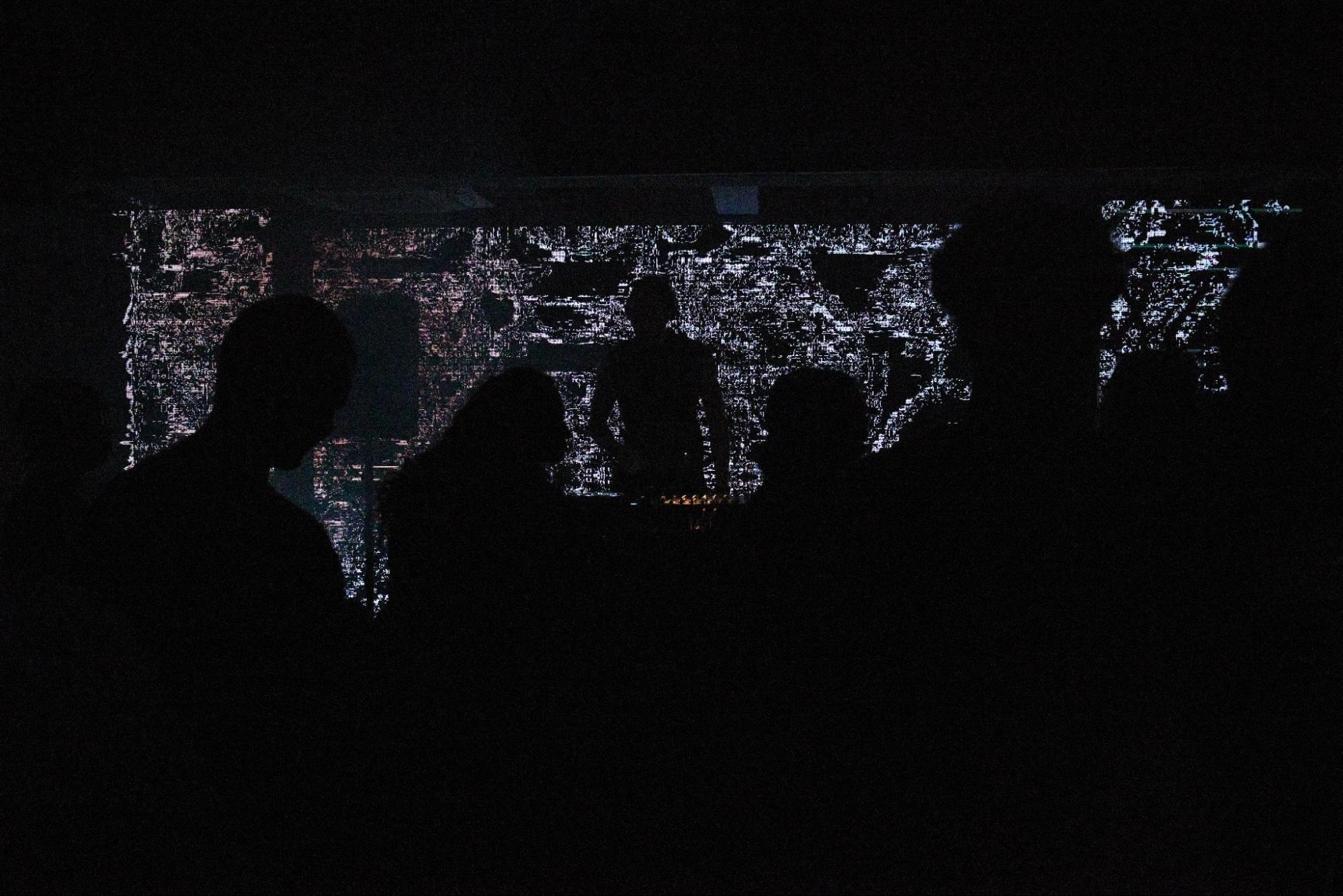
"I believe in unity rather than segregation among queer individuals, fostering education and open-mindedness to understand that 'being different from you' doesn't equate to being 'bad'." - Mae Happyair, Co-founder of NON NON NON (Thailand)
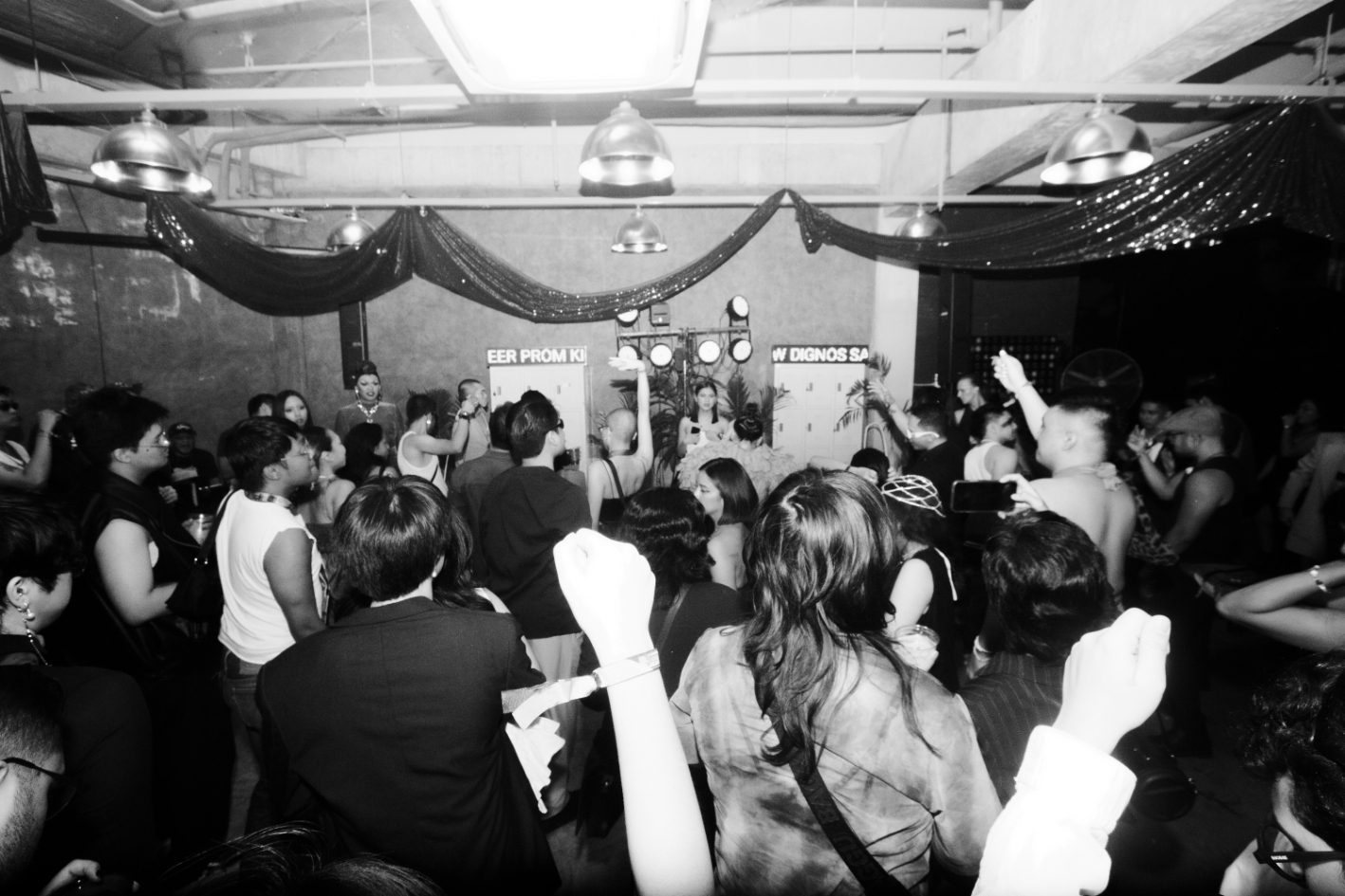
Elephant (Philippines)
That Elephant Party, or simply Elephant, is a queer rave collective in the Philippines that offers an inclusive and creative space for self-expression through music, fashion, and movement. Founded by a group of LGBTQIA+ artists and event organisers, Elephant provides a haven for their community, celebrating diversity and challenging social norms. Elephant has thrived by hosting themed nights and international DJs, fostering a sense of community and resilience. The collective continues to advocate for equality and inclusivity, aiming to shape the future of Filipino nightlife and support local queer talent.
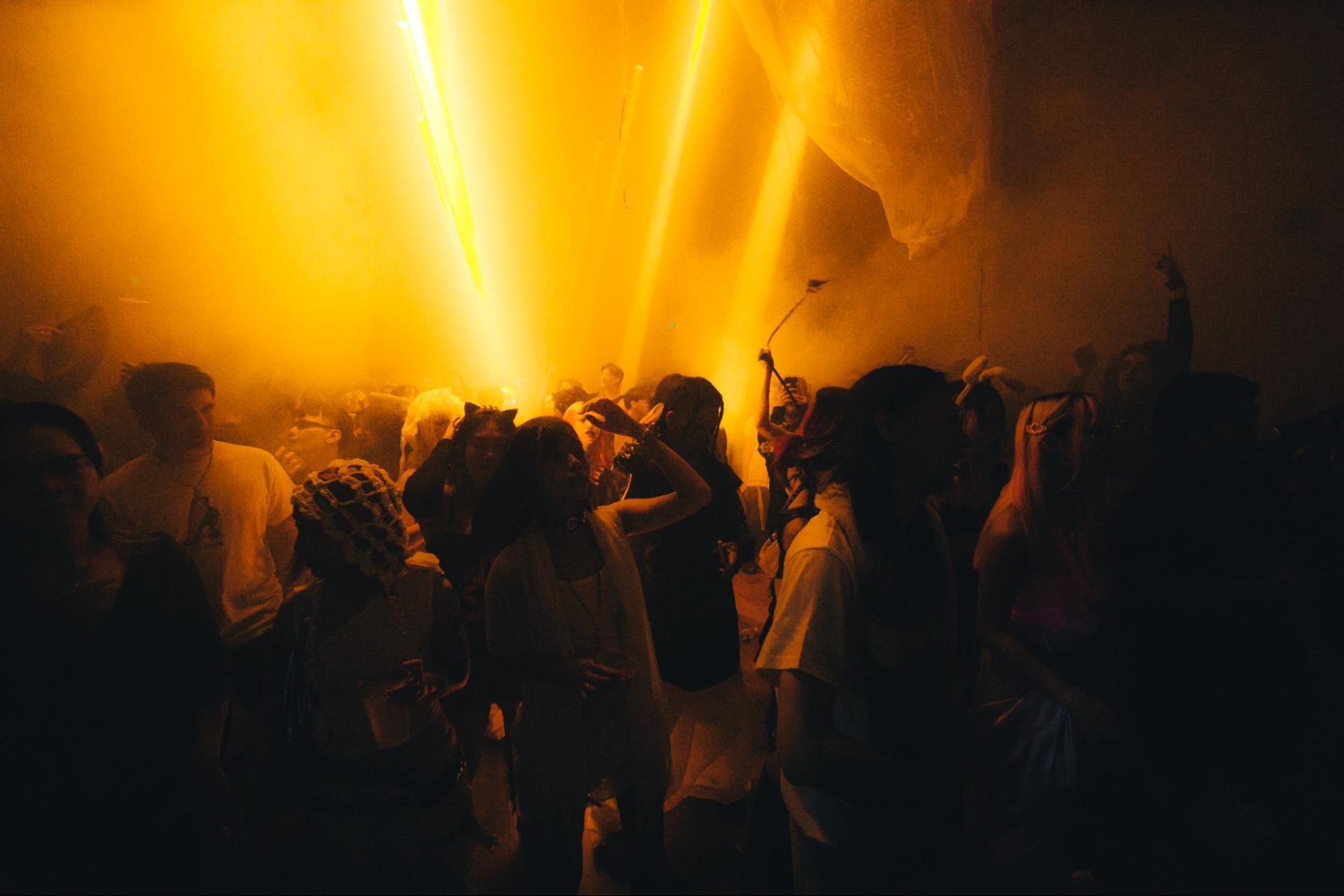
Bussy Temple is a collective of creatives organising raves centred around queers, trans, nonbinary and femmes; follow them here.
howrøng is a DJ, musician, event organiser, researcher, and co-founder of Bussy Temple; follow them on Instagram here.
Zenon aka Metamoksha is a DJ, curator, event organiser, and co-founder of Bussy Temple; follow them on Instagram here.
Minsoo is a photographer, zine-maker, and co-founder of Bussy Temple; follow her on Instagram here.
Cut through the noise - sign up for our weekly Scene Report or follow us on Instagram to get the latest from Asia and the Asian diaspora!


